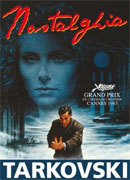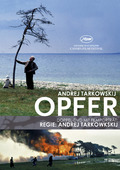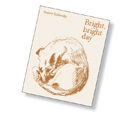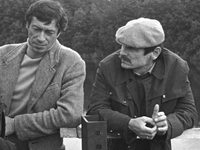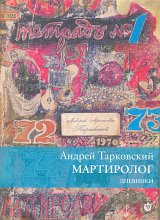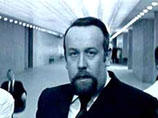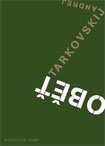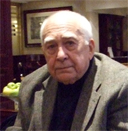
Offret is being screened at Stockholm Konserthus on November 9 during their annual Tonsättarfestival. More info here. Booklet for the screening (images provided by Nostalghia.com/Löthwall) can be viewed here. Nathan Dunne's (Ed.) Tarkovsky has been reviewed in the latest issue of film-philosophy.com. Access the review here. We received the following letter from Mark Le Fanu a few weeks ago:
October 21, 2008 Dear Trond "Mirror by Mirror" I meant to tell you about an art exhibition here in Aarhus Denmark based on ideas and images from The Mirror. It runs until mid November. The artist is a Ukrainian named Sergei Sviatchenko who has been based here in Denmark for a number of years. The work is in collage format, and will continue to be exhibited at Galleri Image in the city centre until the end of November. Marina and Sasha were here a fortnight ago to help launch the exhibition. Later it will be going on to Moscow. I've contributed a short essay to the catalogue. Kindest regards, as always MarkFurther to the above, Sergei Sviatchenko kindly provided the following images — click for larger versions.
Hi Trond, [...] The french DVD of Nostalghia has been released this week and it is a great surprise. I've watched it and this is by far my favorite master until now. Image is very similar as the old R1 Fox Lorber, but I would say maybe sharper, colors are rich, the contrast is very good too, especially in dark areas which are respected. I would say the only downfall is that it is 16/9 compatible to 4/3, but image seems slightly resized from 1.66 (which seems to me the original format) to 1.77. This is quite minor and the DVD is gorgeous to me. The best to date in Region 2 and PAL, with french subtitles. I have a few captures here including one with subtitles: [ i | ii | iii | iv | v | vi ] Here is a link to get it. Regards, Michael Lellouche(For information about other DVD versions of Nostalghia, see our September 4, 2007 (scroll down on this page) and July 31, 2005 news updates. See also October 20 and 31, 2005 news entries, as well as the surprising May 25, 2004 update which we hope to update you again on, soon).
We received the following interesting note from site visitor Tony Partridge of Ireland: Dear Jan and Trond, I inadvertently came across the following information today, information that I hope you will find interesting. I was in my local bookshop and spotted a book on the shelf and found an interesting three page article in it on Tarkovsky's "Solaris". The article is called "Solaris and the White, White Screen" by Lilya Kaganovsky (who is an assistant professor of Slavic Languages and Literatures, Comparative Literature and Cinema Studies at the University of Illinois at Urbana-Champaign) and is in the book called, "Picturing Russia Explorations in Visual Culture" edited by Valerie A. Kivelson and Joan Neuberger and published in 2008 by Yale University Press. The article is on pages 230-232 and there are two coloured stills from "Solaris" in the centre of the book. The article itself has some inconsistencies in it. For instance it names "The Steamroller and the Violin" as one of Tarkovsky's five Soviet films and leaves "Mirror" from this initial list. Then, later, there is a short discussion of The use of Leonardo's portrait of the young lady with the juniper in the film "Mirror". However, more important is that, in discussing "Solaris", the author says that one of Tarkovsky's "perennial concerns" is "the consequences of confrontation with an incomprehensible and alien Other." Surely this is one of Lem's "perennial concerns" rather than one of Tarkovsky's. Then I'm afraid that the rest of this article seems predicated on this initial mis-reading of Tarkovsky's film(s). The points made are interesting, but they are hardly central and important points in a discussion about Tarkovsky's oeuvre in a major anthology like this one. Other articles on film included in the anthology are on "The Cinema Pastoral of the 1930s", on Eisenstein's Ivan the Terrible, and on Mikhail Romm's Ordinary Fascism. I haven't read any of these articles yet. All the best, Tony Partridge, Sligo, Ireland.
Site visitor Pilar Carrera informs us that she has recently published an essay about Tarkovski. The essay, written in Spanish, is called "Andrei Tarkovski. La imagen total". It can be purchased via this link. It is published with support from Fondo de cultura económica. Guido Gräsel of Germany sent us a collection of beautiful East German (GDR) lobby cards. We are pleased to present them, here. Thanks, Guido! Still looking for an excuse to buy that Blu-Ray player? Stay tuned... Black Dog Publishing is offering our readers a special academic discount of 40% on all orders for the book Tarkovsky [Dunne, ed., 2008].
Petr Gajdosik of nostalghia.cz provides a short review of the Russian edition of the book Il cinema di Tarkovskij e la tradizione russa by Simonetta Salvestroni (see our April 14, 2006 update). And here is a travel log from Petr's trip to Fårö. The Netherlands Socety of Cinematographers has a page referencing our piece on Sven Nykvist's book, here. Russa! Magazine is both fun and clever (for those so inclined). They recently included some Tarkovsky related content — see the poster featured on this page. You may have to look closely to spot it.
Dear Nostalghia.com I would like to forward my art work inspired from Ivan's Childhood for your interest and information. I had a solo exhibition in Frankfurt, Germany in February 2008 called Darkness Moves. All the images are from the film Ivan's childhood. As an artist I work with unforgettable images that have had an long lasting impact on me. The everlasting impression and the almost empty and sacral space is something I have tried to transfer to the paintings. The theme I worked with in the exhibition was "loss" as in loss of childhood, innocence and of course life itself. Almost every single frame in Tarkovsky's movies can be transfered to a painting as the composition in the images are so strong. I hope you or any of your readers would find it interesting to view. It would great to have viewers with the same passion. I have attached a low quality pdf file but can mail better quality if needed. Images from the exhibition can also be viewed on the gallery's website Kind regards Cecilia Westerberg +45 20919097 cwesterberg[at]yahoo.com We received the following request from Terence McSweeney. We encourage those of our readers so inclined to get in touch with him asap. Dear Nostalghia.com, I hope you don't mind me contacting you. I have been a long time admirer of the site. My name is Terence McSweeney and I am a PhD candidate at the University of Essex in England where my thesis is on Andrei Tarkovsky and called 'Beyond the Frame: The Films and Film Theory of Andrei Tarkovsky.' Some of my work was included in the volume Through the Mirror: Reflections on Tarkovsky (Cambridge Scholars Press, 2006) and some is also due to be published in the book Faith and Spirituality in Masters of World Cinema due in early 2009. My PhD is due for completion in December 2008 and I was wondering if it would be appropriate to use your site as a way to find if there are any Tarkovsky scholars out there who would be interested in reading the document? I should make it clear that I don't require a proof reader, rather an informed opinion on the work as it stands. Perhaps suggestions, comments and criticism in as little or as much detail as the reader prefers. I haven't seen any requests like this on the site before so if it is inappropriate please feel free to discard it. If not I can be contacted at this address tmcswe[at]essex.ac.uk. Thank you very much for your time. Regards Terence McSweeney London, England We got this tip from an anonymous reader: Hi, Some of the leading musicians in the electronics musics field have some recordings for a homage to Tarkovsky. Entitled In Memoriam Andrey Tarkovsky The compilation is available as a free download at the site below. It may be of interest to you: Link: excentrica.org Artwork is also available.
Andrei Tarkovsky International InstituteThe Institute will then provide the necessary money transfer information. Italian customers can use the "contrassegno" payment. Our quick look at this edition can be found here.
The Russian edition of Martyrolog (Tarkovsky's diaries) has finally landed on our desk and we are preparing a review. In the meantime, here is an interview with Andrei Tarkovsky Jr. at Radio Kultura [Russian]. Some important items:
Among many pleasures of running a web site like this are the e-mails we receive. They provide insight into events of the past which would be very hard to obtain in any other "systematic" way. The Internet serendipity is the key! Here is one example of an interesting postscript to Tarkovsky's trip to the 1983 Telluride film festival. On our The 1983 American Visit page there is a reference to a filmmaker from the Philippines. The same trip is described by Olga Surkova in her book Tarkovsky and I. Diary of a Girl Scout:
And here is the e-mail we received on April 19, 2008:
Company Rotermann City, which is developing the Rotermann district in Tallin, wishes to give the name "Stalker's Way" to a street in honour to the great movie that was partly shot in that area. "We want to keep the "Stalker's" spirit, because part of the movie was shot here," marketing manager of the company Marika Mäsak says. The City Government will say its decision at the end of May, when next meeting of name-committee will be held. The street as well as the whole area is planned to be car-free. In addition, Bernard Beck provided us with this link. We saw this article and thought of Andrei Rublov.
Tarkovsky (Nathan Dunne, ed.) was the Book of the Month in the May issue of Sight & Sound, which also carried a long review. The Times provided a review of the book (as well as of Robert Bird's book) this past Saturday. There are also some comments in the Scottish periodical The List. The full program of the Tarkovsky Tate event can be seen here. A very interesting list of speakers has been confirmed, and we are told that tickets are selling fast.
We recently posted a brief Tarkovsky/Abbado related clip on youtube. Claudio Abbado turns 75 this year. There is another interesting Tarkovsky related item here. The publisher's note on the new Russian Martyrolog mentions some of the publications that are going to follow: Sculpting in Time and then — among others — the Work Diaries. We have been aware of, and longing to read, the Stalker work diary ever since we (8 years ago) read the May 26, 1980 entry in the Polish extended version of Martyrolog (not included in the English edition): "May 26, Monday: I must start another diary to write down everything pertaining to my work. Just as I did with Mirror and Stalker." The Mirror Work Diary has been published in a stunning, and now much sought-after, Japanese edition which faithfully reproduced Tarkovsky's own diary "layout". It has also been published in German, translated by Kurt Baudisch and Ute Spengler (Verlag Ullstein, 1993). Though facsimiles of a few diary pages are provided, the German edition made no attempt at reproducing the original look & feel of Tarkovsky's original diary: [ example i | example ii | example iii ]. Let's hope the Russians try to outdo the Japanese with their upcoming Work Diary releases... Michal Petricek recently related to us the interesting history of the first Czech translation of the Martyrolog: "It was made by Marek Seckar in 1997 from a French translation(!) of the book. Well, on one hand, he did a lot of work and many Tarkovsky's admirers in the Czech Republic have been grateful to him (including me, of course), on the other hand, his work has many serious imperfections. You can imagine, a translation of another translation... It's risky, to put it mildly. Mrs. Galina Kopaneva was really furious with the work and wrote a list of errors of the translation in a special 8 pages long article in the journal Film a doba in 1998." (Our readers may recall that we had our reservations with regards to the completeness of the French "definitive" edition; we will provide a similar assessment of the new Russian edition)
The following note just in from site visitor Taimo Joots of Estonia: Hello, In a posting from year 2006 you asked for translation of an Estonian webpage. I will try to give you a little overview about it. This is a website of Estonian version of geocaching game. For those who don't know, it's a game of seeking hidden "treasures" or "caches" with GPS device. As an honour to the great film and great director a geocache was hidden into a tube under the building of hydroelectrical plant, where "Stalker" was shot. The hiders say, that an amateur movie was being shot on the same location when they arrived. These filmmakers didn't know that "Stalker" was filmed there. More images of the cache-hiding-trip can be seen here. In January 2006 the cache was gone and the renovation of the hydroelectric power station started. Some photos from this time can be seen here. As the building was not suitable for a cache any more, a new geocache was hidden a little further from that location. The new cache is called "Tarkovski is dead, long live Tarkovski!". See here and here. A friend of mine visited the location again last weekend. The renovation work has been stopped and the building of the hydroelectrical station stays abandoned again. Some images here. We should give the owners idea to make the place tourist attraction for Stalker fans instead of working hydroelectrical station. I would also like to say a few words about the legend of poisonous water of the Jägala river, that caused cancer and deaths for members of the film crew. There was and still is a paper plant about 20km upstreams in Kehra. It's waste-water makes the river foam and the air smells quite bad depending on the wind direction. A waterfall near the shooting location makes also foam on the surface of water. But there is no way the water could be poisonous enough to cause cancer. Otherwise the population downstreams must be dead long ago. Regards, Taimo from Estonia
The Art of Andrei Tarkovsky, a symposium examining Andrei Tarkovsky's films in the context of contemporary art, is set to take place on Friday May 9th. Additional details and a complete programme may be found on the Tate Modern website. There's yet another interesting conference on May 10th, at Queen Mary College in London. Details here. Robert Bird is organizing a small symposium dedicated in large part to Tarkovsky's 1983 production of Boris Godunov. The symposium, Performance and Mediation: At the Interstices of Opera and Film, takes place at The University of Chicago on May 3rd, 2008. Here is a preliminary program [PDF].
The Danish company Another World Entertainment released five Tarkovsky titles on March 10th. They are all RusCiCo transfers. Details here. Thanks to Nicolai Fentz of Denmark for the update! More on the launch of the first Russian edition of Martyrolog here [Russian]. See also our February 3 update. More information here. We have still not succeeded in obtaining a copy. A friend with contacts in St. Petersburg writes, "Tarkovsky's book has been delayed to arrive at the stores and [...] everyone is asking for a copy, it [appears] that people are buying it right from the printer's before it even gets to the stores!". (Quite reminiscent of the Communist days, no?) We regret to inform you that Sofiko Chiaureli (Sayat Nova) recently passed away. Some kind soul posted a small memorial on youtube. We have just received one of the Chris Marker DVDs from Wexner Center, and it confirms that One Day in the Life of Andre Arsenevich is forthcoming... There is a documentary about Tarkovsky and Paradjanov on Kino's new Paradjanov box set. For details, see the DVDBeaver review. Thanks to Eric Levy of Chicago for the pointer. More about the above mentioned documentary in the following note from site visitor Tony Partridge. We welcome additional information on this documentary from our readers.
Dear Jan and Trond, After many years searching I finally managed to get a copy of Paradjanov's "Shadows of Forgotten Ancestors" on DVD, a version made by Kino in 2007. As a special feature on this DVD I found a documentary called "Andrei Tarkovsky and Sergei Paradjanov - Islands" that contains some very interesting interviews with Alexander Antipenko, Inna Gens, Kora Tserateli and Levon Grigoryan. I don't know if you know about this documentary so I thought it worthwhile contacting you about it. I am unsure who made the documentary (the subtitles list the film crew as Levon Grigoryan and a list of others, the DVD box says the documentary was made in 2003, but at the end of the documentary the year 2002 is quoted). It is very difficult to work out who is who in the documentary, but many of the anecdotes and comments quoted are fascinating and new to me. For one quotation alone it is worth watching the documentary: one of the men say, "I first heard of Andrei Tarkovsky in Paradzhanov's house. It was the time when the film Ivan's Childhood came to Kiev. Sergey Grigoryevich said that today he would admit into his house only those who had seen Tarkovsky's Ivan's Childhood." There are many other quotes about the relationship between Tarkovsky and Paradjanov and the documentary is then interspersed with clips from the films of each, clips that often contrast their mutual depictions of, say, water or horses. Thanking you for your time and attention, I remain, Yours sincerely, Tony PartridgeAnother Parajanov DVD set has recently appeared on Ozon: Part 1 and Part 2. Nostalghia.cz has a review. Ok, how about a wonderful 2000 x 6000 pixel Solaris poster [5 MB], courtesy of site visitor Guido Gräsel of Germany? Thanks, Guido! The poster will be added to our Posters section upon next update. Those of our readers who appreciate Tarkovsky and Sokurov may also appreciate Italian director Manuele Cecconello's stunning Olga and Time, which won the prize for "Best Long Documentary" at the VII International Documentary Film Festival "FLAHERTIANA-2007". We received a screener DVD of the film here at newsdesk last year, and urge you to, if at all possible, catch the April 5 screening at The British Museum. Details here. We received the following note from Petr at sister-site nostalghia.cz: Dear Trond, today, I wrote a Czech review of new book on spiritual cinematography by Jaromir Blazejovsky. The review is found here It's a very interesting look at spiritual cinema, also about Dreyer, Bresson, Tarkovsky, Ozu, Sokurov, Zvyagintsev and other world directors, as well as Czech directors (Vlacil, Zabransky, Tyc). Here is an English summary [PDF]. Best regards, Petr P.S.: Petr of nostalghia.cz has also posted a travel log from his summer road trip across some relevant parts of Russia: part i | part ii.
The documentary film The Mystery of Andrei Rublev recently aired on Russian satellite TV channels. Michal Petricek sent us two snippets from the documentary: [ clip 1 | clip 2 ]. Clip 1 speaks about the original author of the basic idea of shooting film about Andrei Rublev, Vasili Livanov. The documentary is, according to Michal, very interesting, in that it reveals several heretofore unknown facts about the circumstances surrounding the production of Andrei Rublev. [UPDATED: Thanks to Marcis Berzins for correcting Mr. Livanov's name for us].
Pascal Vandelanoitte of Belgium informs us that an article he wrote was published in Perspectives on European Film and History last autumn. Says Pascal, "In my article, I demonstrate that a deeper knowledge about early Russian history helps to understand Andrei Rublev on a historical level as well, and that in the movie, the historical level about the early birth of a unified Russia and the personal story about Rublev's catharsis are beautifully intertwined and reinforce each other." Site reader Dan Jones recently completed his Ohio University Ph.D. dissertation on Andrei Tarkovsky's films and philosophy. The dissertation may be accessed online, through this link. Many, many thanks to the kind anonymous soul from Norway who sent me Nuri Bilge Ceylan's Distant (Uzak), as well as Pirjo Honkasalo's The 3 Rooms of Melancholia. Most of our readers will already be aware of Ceylan's film, and its Tarkovskyan connections. The 3 Rooms of Melancholia is perhaps a lesser-known masterpiece — absolutely unforgettable... comes highly recommended! —Trond.
Black Dog Publishing are set to release Tarkovsky next month, a comprehensive new collection of what appears to be eminently readable essays on Andrei Tarkovsky from some of our favorite academics. For further information on the book, check out the publisher's website. A new Polish edition of Sculpting in Time has just been released. Translation is by our longtime collaborator in Poland, Dr. Seweryn Kuśmierczyk. Details here. Cover art here [PDF]. Tarkovsky's The Mirror will be screened at the Tromsø International Film Festival as a part of their 100 ÅR MED RUSSISK FILM program. The festival runs from January 15–20. Screening times for individual films will appear on their website. Thanks to Alex Muller of Portland, Oregon for the heads-up. We received the following note from site visitor Tony Partridge in Ireland. Dear Jan and Trond, I though you should know that in the October 2007 issue of Sight and Sound (page 8) there is an article called "Making the ruins speak" by Brian Dillon which is about artist Jeremy Millar's 'Mirror-Time' art work based on Tarkovsky's Zone from Stalker. Then, in the January 2008 issue of the same magazine (page 10) there is an article called "The long road to freedom" by Ian Christie that is ostensibly an introduction to the Tarkovsky festival at the Curzon mayfair cinema in London and an exhibition of Tarkovsky's polaroids at the White Space Gallery in London. However, the article is much more than this. It is essentially a meditation on 'freedom' and Tarkovsky. All the best, Tony Partridge, Sligo, Ireland. The following just in from Daniel Graham of Artificial Eye. Dear Trond, I'm very pleased to inform you that the Tarkovsky Festival at the Curzon Mayfair Cinema from 7-13 Dec was extremely successful with near record attendances for a festival of this kind. Many of the screenings of his films were practically sell out performances. THE SACRIFICE re-issue (7 Dec), distributed by Artificial Eye on a brand new 35mm print, continues at the Renoir Cinema in London from today and goes around the UK at many of the most prominent art house cinemas well into next year. www.artificial-eye.com http://www.curzoncinemas.com/flash/#main Kind Regards Daniel Graham Artificial Eye - Film Booking Manager Tel: 0207 438 9525 There are two photos in our Photos section featuring a mirror effect: Arseni and Andrei. Vlad Baranov wrote to tell us that there is an article about the photographer — Tarkovsky's godfather, Lev Gornong — and his photos, here. Site visitor Bryan Rodrigues pointed us to this interesting article in the Telegraph. There is an interview with Layla Alexander Garrett by Jaap Mees here. Thanks to Conrad Steeves for the pointer. See also Layla's own piece, on Nostalghia.com Regular contributor Bernie Beck of El Sobrante, sent us this link to an article about Arseny Tarkovsky's 2007 centenary. We received the following note from Randolf Smeets. Hello there, just wanted you to know that I've made several music pieces of Tarkovski's films. These pieces are all made from the original music, sounds and spoken material used in his films, in chronological order. So far I've made three pieces: Stalker, Ivanovo Detstvo and Offret. These are all about 20-minutes long. Now I'm working on The Mirror. On myspace.com/forandrei, you can find several 7-9 minutes examples of these three pieces. Just have a listen and I would be delighted of you'd inform me what you think of it. Thanks for your time. Randolf Smeets (aka The Phlod-Nar) Contact: Aurora 218 6412 GL Heerlen The Netherlands 0031 (0)6 - 305 042 39 rozza_quaot(at)hotmail.com *** Disclaimer: this update done from Kona, Hawaii, via spotty internet uplink. Hopefully not too many dead links in the above. — Trond



©2004 www.nostalghia.com
|





